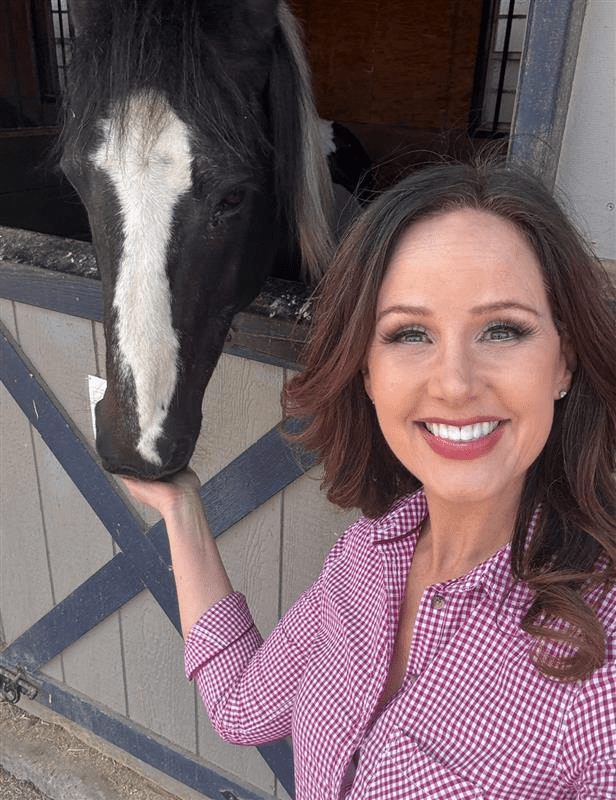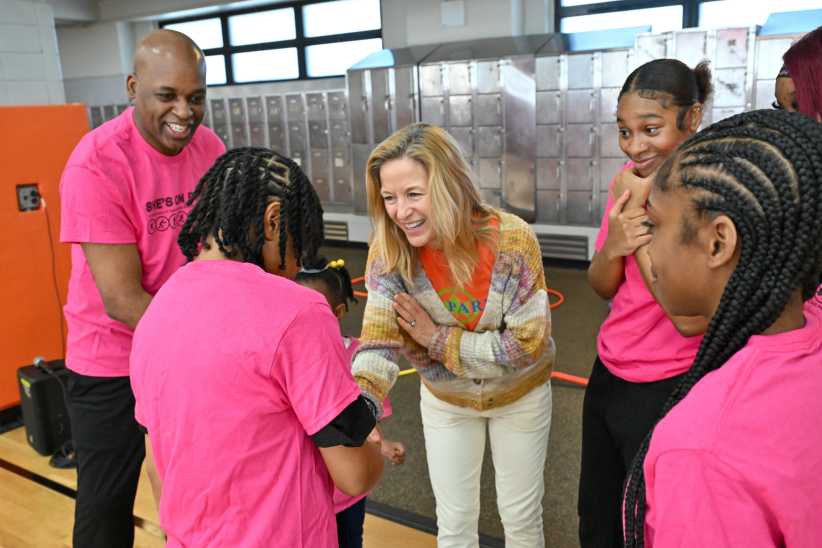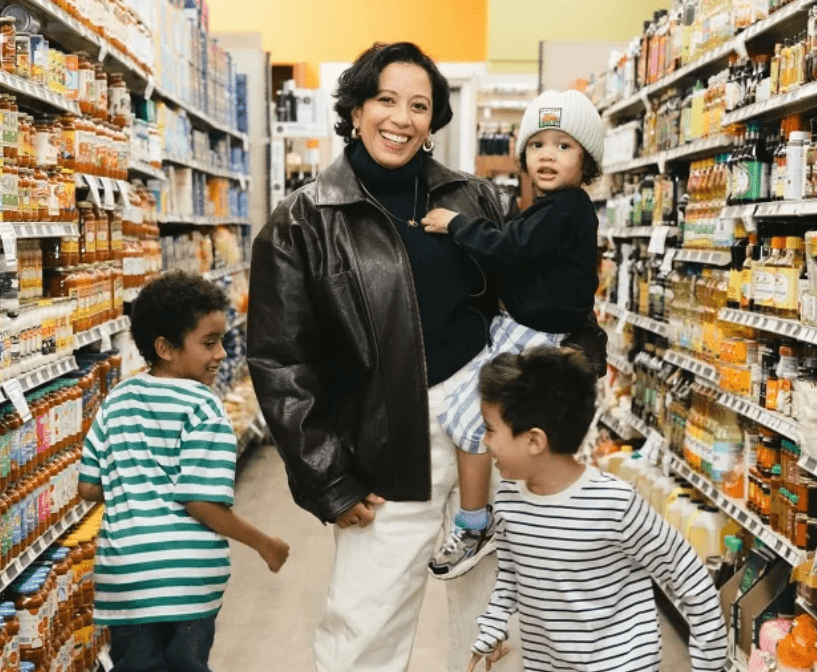In case you don’t happen to have a preschooler at home who has perfect recall of her entire musical oeuvre, Laurie Berkner is the It Girl of kids’ music. With four CDs, a quadruple platinum DVD, and a regular spot on Jack’s Big Music Show on NOGGIN, Berkner has won diehard fans among children and parents alike for her catchy, playful, and inventive songs like “Pig on Her Head,” and “Victor Vito.”
(If you’re familiar with her work, you know that it’s a challenge to even hear the title of one of her songs without instinctively mouthing the follow-up words.)
But Berkner fans used to feasting on their old favorites are in for a special treat: Her first album in six years, “Rocketship Run,” was released last month. And, locally, she’s promoting it with two concerts at Lincoln Center’s Avery Fisher Hall on Sunday, September 21.
Berkner starting catching on as a singer-songwriter of children’s songs over 10 years ago, at a time when she was still working as a preschool music specialist and also as a birthday party performer. Now she’s a mom herself, and a New York City mom at that. She and her husband Brian Mueller—who used to play bass in her band before he left it in early 2006—have one child, their dynamo Lucy, who turns 4 this month. Berkner has such a knack for connecting with kids that she was once dubbed “like the coolest mom there ever was” on NPR’s “All Things Considered.” We have a feeling that Lucy would agree. We certainly do.
When did you first become interested in music?
The big memory I have is from when I was probably about two and a half and my parents would ask me to stay in bed until a certain time in the morning so they could sleep in. I had a Fisher-Price record player, and I always played “The Sound of Music.” I would just march around on my bed to “Do-Re-Mi” and scream at the top of my lungs. I guess our bedrooms were on other ends of the apartment, so they let me do that while they slept.
My guess is you didn’t grow up in a city apartment. How did you end up in New York City?
When I first graduated [from Rutgers University], I came to New York to play music and sing. My parents paid for my rent for one year. I was paying for my food, basically. I did all part-time work. I babysat and I watered plants and I worked with autistic adults—I’d bring my guitar and sing with them. I would also go and sing stuff I was writing in coffeehouses.
Tell me about your first job teaching music to preschoolers.
It was hard. I definitely cried every day. The first year I was there, the kids would be taken from their classes with their teacher to me in this aerobics/gym kind of room. The teacher would stay for a few minutes and leave, so I had 45 minutes with 18 to 20 three-, four-, five-, and six-year-olds. I’d never worked with that age group really. I’d start to sing a song and they might say, “That’s a baby song! I hate that song!” or one kid would get up and just run to the other end of the room and I would get up to get him and by the time I got back, the other 20 kids had started running all over the room. That’s basically what every day was.
What changed?
I asked the teacher to stay in the classroom, and then I didn’t have to focus on being a disciplinarian. That helped me actually get to the music. Then I went and observed the teacher and I asked her, “How do you get them to pay attention to you? How do you get them interested in the music?” She said, “Just stop talking to them. Just say everything through the music and they’ll listen.” That was a huge help. I realized if I wanted to get them to move or to stop or to all come and sit down, I could sing it and they would respond.. . . . I just starting asking the kids “What do you guys want to sing about?” They would yell, “Ice cream! Dinosaurs!” and I was like, “Okay, let’s march around!” And then I just started making it up.
Do you listen to anyone else who specializes in performing and writing for kids?
[My daughter, Lucy] really used to love “I Can Do it By Myself” by AudraRox. We would sing it, and I would throw her in the air and she would yell, “I can do it by myself!” There were periods when we listened to Elizabeth Mitchell and Dan Zanes and Brady Rymer. It’s hard, because it’s really difficult not to be influenced by the music that I listen to. I feel like I can’t listen to those performers because I don’t want to have any question that I’m stealing from somebody else.
How has having Lucy affected you as a songwriter and a performer?
Right after Lucy was born, a lot of people asked me how my songwriting had changed and I was like, “I’m not writing anything!” But that was not completely true—I would write songs that were basically all her name and that were about her, but I would probably never record those. Those were things for me and that time in my life with her. Before I was a parent, I never wrote as a parent. I just wasn’t one, so music came much more from my own childhood and from the classroom, which I think helped a lot in connecting to the kids. Now I feel like there’s more of both in there. I try to stay connected to the child in me, but I’m a parent now, so it’s starting to change.
Would you say that you write for kids—or for families?
When I’m writing a song, I’m thinking about whether the kids will like it and whether I’m going to connect to them through it. I’m also thinking about whether I want to sing it over and over again, so I think that’s the part that connects with the adults. “Old MacDonald Had A Farm” is a great song for kids, but I don’t think I could sing it 100 times!
Tell me about your new album, “Rocketship Run.”
I feel really proud of it. It’s different for a couple of reasons. There is more instrumentation and more musicians and everything is a little more eclectic. I had a lot of musical support from a lot of different people—Adam [Bernstein] and Susie [Lampert], mainly. It’s the first album that Adam, Susie, and I did as a band. We started the process of creating the album by getting together and arranging the music, whereas in the past I would write the songs, come in and play them, and then call Susie and Adam. It’s also the first album where there’s not a single song that I wrote while teaching. In fact, all of the songs were written since Lucy was born. Musically, it’s broader, as well as having a lot of different styles on it. There’s one song that has sort of an Irish feel to it. There’s another that has sort of an almost Appalachian feel to it. There’s a ska version of this one song. The album is really a whole, it’s not just a bunch of songs thrown together. I really chose how to sculpt where each song was on the CD. The name “Rocketship Run” is really describing a journey. The album itself starts with “Rocketship,” and then there’s a song called “Going on a Hunt,” where we’re looking for a treasure. That song comes in five times throughout the album in different styles, and the song that precedes it sort of informs the style of how that “Going on a Hunt” is going to be. In front of each song, we talk about how we’re going on a trip and at the end, where we find the treasure. All the songs in between somehow fit together in this journey. There’s a lot of imagination in listening to the songs taking you on this trip and to the treasure.
How did you go from playing at smaller venues, like school gymnasiums and Symphony Space, to headlining at Lincoln Center and appearing on TV shows like “The View”?
During my first few years of writing kids’ music, when I’d do an in-store performance somewhere, I’d sit in the corner and like five kids would show up and I’d sing everything they wanted and hang out and maybe someone would buy a CD and then we’d all go home. Being on TV, on “Jack’s Big Music Show,” made a big difference. There was just a sudden jump in awareness of people knowing my music existed, and so they started showing up more.
What are some of the biggest challenges of balancing career and motherhood?
Time. And sleep. Part of me wishes that I had waited a year [before working on “Rocketship Run”], because Lucy would’ve been in school at that point and there would’ve been these chunks of time when I wouldn’t have been with her anyway. Instead, I ended up working at night a lot, which took away time from being with [my husband] Brian [Mueller]—and sleep. There are always tradeoffs, and I guess that’s the thing—choosing those tradeoffs.
Do you have to go on the road a lot?
At most, I play a show once a month. A lot of them are local, but I do have shows where I have to fly or take a train. When Lucy was 5 months old, I started playing again and until she was about 18 months, I took her to all the shows. I could bring a babysitter and she would sleep through a show, but as she got older, it didn’t feel fair to bring her somewhere where I had to work the whole time and couldn’t really spend time with her. I remember thinking about her the whole time and wondering how was she doing. It was hard to play those shows while she was there watching because I started to feel like, “Why am I singing for all these other kids? I should be singing just for her. What am I doing up here?”
How would you describe yourself as a parent?
Being a first-time parent and trying to do everything “right,” whatever that means, brings up a lot of anxiety for me. I feel anxious a lot. I really do love this time I spend with Lucy—and I spend a lot of time with her—but it’s hard not to feel guilty wanting to go on a bike ride by myself or to read something that I find really interesting or to just go do something alone. I feel like sometimes I can be overbearing and that I don’t give Lucy space to have relationships with other people. I have a hard time just letting Lucy go. There’s a part of me that loves her growing, and there’s a part of me that’s scared of the separation.
What are the pros and cons of raising Lucy in the city?
The pros are that there are so many people around. I feel like every time I wish we were having a play date so that Lucy had a kid, and not just an adult like me, to interact with, we run into somebody in the lobby or we just walk down to the park. I also like that if I want something to do, if I don’t want to just sit in the apartment, there’s always something that is expansive and fun to go and do with her—a museum or walking up to Broadway. The cons are that I wish we had a big backyard where we could go out and get into the dirt and grow things. To get to something green, we’ve got to go out the door, into the elevator, through the lobby, outside, and past the cars. Sometimes I fantasize about having more green in our lives.
Have there been any parenting books that really influenced or inspired you?
Patricia Shimm, the associate director at the Barnard Toddler Center, has a book called “Parenting Your Toddler: The Expert’s Guide to the Tough and Tender Years” that I think is great—especially the chapter on firstborns, which Lucy is.
Given your public image with a pig on your head, what would people be most surprised to learn about you in your private life?
That I don’t feel cool at all. This is really embarrassing, but sometimes I go into the playground and if I don’t know anybody and someone comes up to me and starts talking to me just because I write kids’ music, I think, “Thank God this is what I do so that somebody will start to talk to me.” I’m actually introverted, but have spent my life teaching myself to be extroverted so that I can make friends and meet people. There’s a lot of will behind that.
**This interview originally appeared in our September 2008 issue. **





















